Episodes
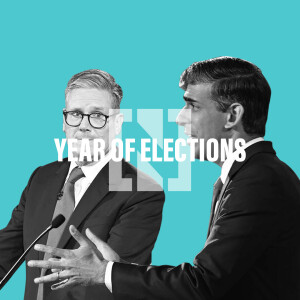
Monday Jul 01, 2024
Monday Jul 01, 2024
The UK's Conservative Prime Minister Rishi Sunak and Labour Party leader Keir Starmer have entered the final straight in the race to Downing Street, with voters going to the polls on July 4.
The general election is being fought largely on the issue of the economy. But Mr Sunak’s campaign has been hit by false starts and pitfalls, putting in jeopardy the prospect of his party continuing to govern after 14 years in power.
In this episode of the Year of Elections podcast, host Damien McElroy, London bureau chief at The National, looks at how a change of government could affect the Middle East and analyses how Scottish politics is changing.
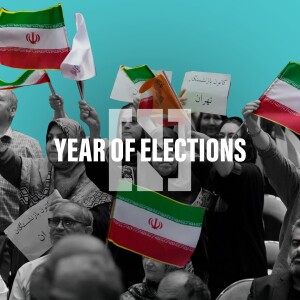
Monday Jun 24, 2024
Monday Jun 24, 2024
Iranian voters prepare to head to the polls on June 28, following the sudden death of Iranian President Ebrahim Raisi in a helicopter crash in May.
This coming election is significant because not only will it shape Iran's political landscape, but it promises to influence Tehran’s relationships with the international community. Economic sanctions, the nuclear programme and Iran's role in the wider Middle East are just a few of the burning issues that form the backdrop to this contest.
In this episode of the Year of Elections podcast, host Declan McVeigh delves into the coming presidential election with Ismaeel Naar, The National’s Arab Affairs editor, and Arash Azizi, author and Iranian affairs columnist for The National.
The conversation provides in-depth analysis of the candidates and discusses what their presidencies could mean for Iran's domestic policies and international relations, with a focus on how they could tackle key issues such as sanctions, the nuclear programme and Iran's role in the Middle East.
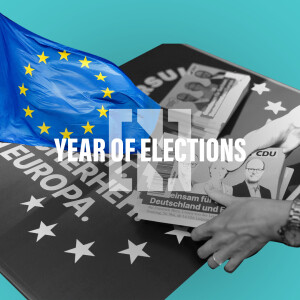
Monday Jun 03, 2024
Monday Jun 03, 2024
On Thursday June 6, hundreds of millions of Europeans will head to the polls for a unique and significant election. Instead of choosing their national governments, voters will elect representatives to the European Parliament in Strasbourg in the world's only popularly elected multinational legislature.
The context of these elections is vastly different from the last European elections in May 2019. Since then, the UK has exited the EU, and the continent has endured the global pandemic. Despite these changes, pressing issues such as migration, climate change, economic uncertainty and the conflicts in Ukraine and Gaza continue to dominate European politics.
The choices made by voters will significantly influence the domestic and foreign policies of one of the world's most crucial political and economic blocs.
In this episode of the Year of Elections podcast, host Declan McVeigh delves into the coming elections, with insights from Sunniva Rose, The National’s correspondent in Brussels, and Dubai-based international relations professor Justin Gibbins to explore how these elections are set to unfold, as well as their potential impact on Europe’s future.
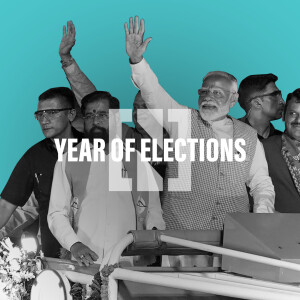
Monday May 20, 2024
Monday May 20, 2024
India’s general election, the world’s largest, is now a month in, and a fortnight away from its conclusion on June 4. By the time the last ballot is counted, more than half a billion people will have made their voices heard on the country’s future.
The challenge at this stage in the vote has been turnout, as the most recent phase saw only two thirds of eligible voters show up.But while voters may appear a little apathetic, the politicians themselves have a very large presence indeed.
The two main rivals are Prime Minister Narendra Modi’s Bharatiya Janata Party, in power for 10 years, and the India National Development Inclusive Alliance, referred to as INDIA, which comprises 26 parties including the leading opposition party, Indian National Congress.
In the second episode of Year of Elections podcast, focusing on India's polls, host Sulaiman Hakemy gets into the issues at stake, exploring the reasons behind the voter turnout and what the results of the vote might mean for India in the years to come.
He is joined by from New York by Johann Chacko, who is The National’s South Asia columnist, and from Delhi by Aarti Jerath, a veteran journalist and political commentator.
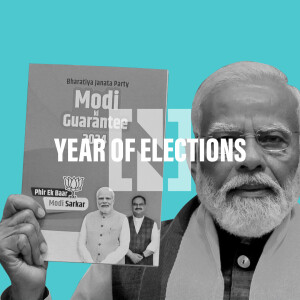
Monday Apr 22, 2024
Monday Apr 22, 2024
Over the next several weeks, about 970 million people in India will cast their ballots in the world’s largest election.
The country holds general elections every five years to elect members of the Lok Sabha, the lower house of Parliament. The winning party – or coalition of parties – will be able to form a government and choose the prime minister.
But it takes a long time to get to that point – this year, the election process will last 44 days. There’s plenty for voters to think about. India has more than 2,500 political parties, although 10 hold 86 per cent of the Lok Sabha’s seats.
Prime Minister Narendra Modi has been in power for a decade now, and his Bharatiya Janata Party is one of the largest political parties in the world, with more than 180 million members. Recent polls suggest the BJP will win to secure a third term for Mr Modi, but there are some challenges to overcome first.
In this episode of the Year of Elections podcast series, Sulaiman Hakemy, The National's opinion editor, and Taniya Dutta, The National’s correspondent in India, delve into the significance of the country's elections this year and look at how the polling operation is carried out.
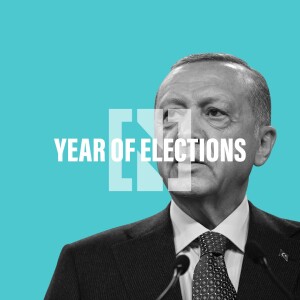
Monday Mar 25, 2024
Monday Mar 25, 2024
Turks will head to polls for the municipal elections that will take place on Sunday, March 31 in a vote that will direct the country’s political direction.
Less than a year ago, Turkish President Recep Tayyip Erdogan won a third term in office until 2028. It will likely be his last, unless he pursues a constitutional reform to allow him to run for another term.
The ruling Justice and Development Party (AKP) and the largest opposition party Republican People’s Party (CHP) present two very different visions for Turkey: the former's vision is one that continues to reshape the republic in Mr Erdogan’s image – more conservative, more nationalist and with a greater role for religion in public life. The latter presents an alternative aiming to reshape the republic into something the opposition says is closer to what its founder envisioned: more secular and cosmopolitan.
In this episode of the “Year of Elections” podcast series, we delve into the upcoming Turkish elections, the significance they hold for the country's political landscape and the contrasting visions each party presents for Turkey's future.
Join host Sulaiman Hakemy, The National's Opinion editor, in conversation with David Lepeska, an author and journalist who is also the Turkish and Eastern Mediterranean Affairs Columnist at The National.
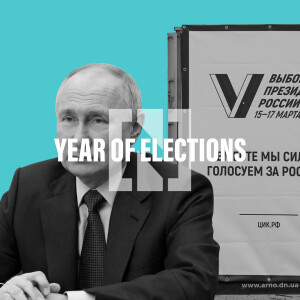
Monday Mar 11, 2024
Monday Mar 11, 2024
Russia, the largest state in the world and a key player in global geopolitics, is gearing up for its presidential election on March 14 amid international scrutiny and domestic complexities.
Since February, 2022, when it launched an invasion of Ukraine that sparked a brutal war that continues to this day, Russia has reshaped – perhaps forever – the world’s conversations about geopolitics, peace and security.
Few expect anyone to come out on top other than Russia’s current president, Vladimir Putin. He has held the presidency since 2012 and before that held it from 2000 to 2008. He was also prime minister from 1999 to 2000 and from 2008 to 2012.
Join Sulaiman Hakemy, The National's Opinion editor, in conversation with Mary Dejevsky, a seasoned writer and broadcaster, as they delve into the political landscape in Russia, power politics in Moscow, and why Putin is so popular.
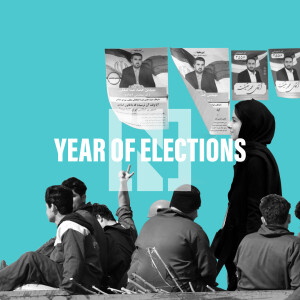
Monday Feb 26, 2024
Monday Feb 26, 2024
Iranians are getting ready to go to the polls for a vote taking place on March 1 in the 12th legislative election the Islamic Republic will have held since its founding in 1979.
A country of nearly 90 million people, Iran’s government is at the centre of several ideological battles at home, in the Middle East and on the international stage.
A wave of protests swept Iran from September 2022 and lasted well into the spring of the following year after the death of 22-year-old Iranian woman Mahsa Amini, who was arrested by Iran’s religious police on suspicion of not wearing a headscarf properly. Although the protest movement has subsided, many inside Iran say the relationship of the country’s young people with the state – particularly that of young women – has changed irreversibly.
Two former presidents have already described these elections as neither free nor fair and authorities are worried that the aftermath of the protests, widespread dissatisfaction with the economy and general disenchantment with the country’s system of governance will result in the lowest turnout the Islamic Republic has seen.
In this episode of Year of Elections, The National’s Opinion Editor Sulaiman Hakemy looks into all of that with Arash Azizi, a senior lecturer in history and political science at Clemson University, South Carolina, and Milad Dokhanchi, a renowned cultural critic and entrepreneur.
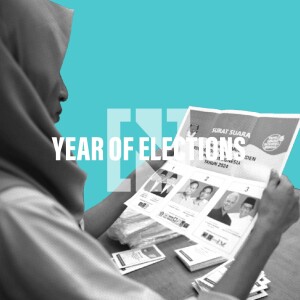
Tuesday Feb 13, 2024
Tuesday Feb 13, 2024
In this week’s episode of Year of Elections podcast series, host Sulaiman Hakemy looks at Indonesia, where 200 million eligible voters will go to the polls on February 14 in the world’s largest single-day election to choose a new president,, vice president and parliamentary and local representatives.
Indonesia, a nation of 280 million people, is the world’s largest Muslim-majority country and its third-largest democracy. With nearly half of its population under the age of 30, the country is brimming with potential. It is expected to be the planet’s sixth-largest economy in only three years’ time.
President Joko Widodo, who has put in place grand plans to move the country’s capital from cramped Jakarta to a new city on the island of Borneo, and pledged to make Indonesia a member of the OECD, will step down as his term comes to an end. Vying to take his place are a former military general, a one-time academic, and a former governor who is a self-styled “man of the people”.
We interview Monica Wihardja, who was formerly an economist for the World Bank in Jakarta and currently a visiting fellow at the ISEAS Yusof Ishak Institute, and Sholto Byrnes, who is The National’s long-time East Asian affairs columnist.
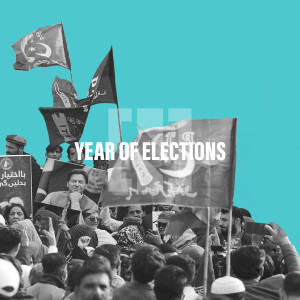
Monday Feb 05, 2024
Monday Feb 05, 2024
In the first episode of the Year of Elections podcast series, host Sulaiman Hakemy looks at Pakistan, where 241 million people are about to vote.
Pakistan is a nuclear power and one of the most populous countries in Asia, and is mired in a political and economic crisis.
The run-up to the elections, scheduled for February 8, has seen one of its leading figures, former prime minister Imran Khan, imprisoned, as a host of political parties gear up to set a new direction – or not – for the country's political future.
We interview Husain Haqqani, a prolific journalist, academic and political activist who spent three years as Pakistan’s ambassador to the United States, and Johann Chacko, who is a regular South Asia columnist for The National and researches politics and extremism in Pakistan at the School of Oriental and African Studies in London.






